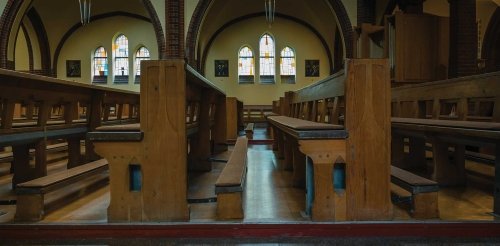3 Big Numbers That Tell the Story of Secularization in America
Americans’ belief in god has hit an all-time low — but some true believers insist that religion is stronger than it has ever been. Sociology professor Phil Zuckerman comments on secularization in America and the world.

This piece is excerpted from an article published in The Conversation.
The most notable critic of secularization was sociologist Rodney Stark, who, in the 1980s, insisted that secularization theory was a sham. Stark was so sure that religion was as strong as ever that he wrote the very idea of secularization ought to be carried off to “the graveyard of failed theories.”
Secularization cannot occur, Stark argued, because religion addresses certain human needs and fears that are fundamental, universal and unchanging. He viewed religions in diverse societies like companies in an economy: If a religion appears anemic, it is only because its “firms” aren't marketing themselves well enough. Once they improve their outreach, messaging and branding, religious life continues as usual, or even increases.
Why is secularism increasing? The transition from a traditional nonindustrial society to an urban, industrial or post-industrial society is a key part of the answer.
–Phil Zuckerman
As recently as 2015, Stark wrote that religion in the U.S. has actually strengthened, arguing that Americans simply aren't responding to pollsters much anymore, and therefore results were unreliable. He also noted that only a small slice of people identify as atheists: fewer than 5% in most nations.
In our 2023 book Beyond Doubt, however, my co-authors and I argue that religious faith, participation and identification are unambiguously weaker than they have ever been.
This is not only true in the U.S., but many parts of the world. ... In 2013, for example, 10% of Libyans and 13% of Tunisians said that they had no religion. By 2019, those numbers had more than doubled. Declines in belief in God are apparent in countries from Denmark and Singapore to Malaysia and Turkey.
But why? In our analysis, the transition from a traditional, rural, nonindustrial society to an urban, industrial or post-industrial society is a key part of the answer — along the lines of the first sociologists’ predictions. As these changes take place, religion is more likely to become unyoked from other aspects of society, such as education and government. ...
In nearly every society that we examined that has experienced these concomitant phenomena, secularization has occurred — often in spades. Of course, compared to most other wealthy countries, the U.S. is quite religious. Fifty-five percent of Americans, for example, say they pray daily, compared to an average of 22% of Europeans.
Still, we argue that the latest numbers regarding religious belief, behavior and belonging in the U.S. paint a clear portrait of secularization. Beyond the more universal factors, other developments that have been detrimental to religion include a strong reaction against the political power of the religious right, and anger at the Catholic Church’s child sex abuse scandal. The consequences of religion’s weakening are unclear. But while its meaning for America remains an open question, whether secularization is happening is not.
Zuckerman is professor of sociology and secular studies. This excerpt from a recent commentary piece is reprinted with permission of The Conversation. Read the full piece here.
Learn more about his new book, Beyond Doubt.